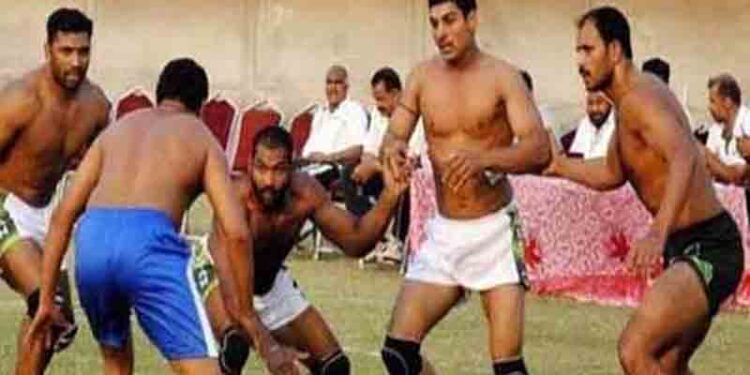The highly anticipated Baba Guru Nanak International Kabaddi Cup commenced today in Lahore, marking a significant step forward for the sport of kabaddi in Pakistan. The tri-country tournament, held under the auspices of the Pakistan Kabaddi Federation (PKF), features strong teams from Pakistan, Iran, and India, all competing over the course of three days at the WAPDA Sports Complex.
Warm Welcome for International Teams
The Indian and Iranian kabaddi teams arrived in Pakistan yesterday to a warm and enthusiastic reception. Officials from the Pakistan Kabaddi Federation were present at the airport to greet the visiting players, highlighting the spirit of sportsmanship and international friendship. The teams have been provided with exceptional hospitality and accommodations as part of the country’s commitment to hosting international sporting events with professionalism and care.
A Step Toward Sports Diplomacy
The arrival of Indian and Iranian athletes on Pakistani soil is particularly meaningful given the often tense geopolitical relationships in the region. This kabaddi event not only represents an opportunity for sporting competition but also serves as a diplomatic gesture that promotes peace, understanding, and unity among neighboring countries.
According to Rana Muhammad Sarwar, Secretary of the Pakistan Kabaddi Federation, extensive efforts have been made to ensure the successful organization of the tournament. From logistical arrangements to venue preparations, every detail has been meticulously planned. The participation of Indian and Iranian teams has been made possible through continuous dialogue and coordination by the Federation’s leadership.
Leadership Behind the Scenes
One of the key figures behind this international event is Chaudhry Shafie Hussain, the President of the Pakistan Kabaddi Federation and the current Provincial Minister for Arts and Commerce. He has been instrumental in encouraging international participation and strengthening kabaddi ties with Iran and India. Under his supervision, all arrangements for the Baba Guru Nanak Kabaddi Cup have been finalized.
Chaudhry Shafie Hussain personally engaged with the kabaddi federations of both Iran and India to convince them of Pakistan’s readiness and safety in hosting such a tournament. His successful diplomacy has now led to a competitive, high-profile kabaddi event that could serve as a blueprint for future international collaborations.
A Tribute to Baba Guru Nanak
The kabaddi cup is named in honor of Baba Guru Nanak, the founder of Sikhism, who is deeply respected in Pakistan, especially in the Punjab region where many of his historical sites are located. Hosting an international kabaddi tournament in his name not only promotes the sport but also pays tribute to his legacy of peace, inclusivity, and harmony.
This event holds religious and cultural significance, especially for the Sikh community in Pakistan and India. It aligns with ongoing efforts by the Pakistani government to foster interfaith harmony and celebrate the shared heritage of the subcontinent.
Tournament Format and Schedule
The Baba Guru Nanak International Kabaddi Cup is set to run for three days at the WAPDA Sports Complex in Lahore. The tournament will follow the traditional circle-style kabaddi format, which is highly popular in South Asia and is known for its fast pace, strength-based tackles, and vibrant audience engagement.
Each participating nation will face the other teams in a round-robin format, with the top two advancing to a final showdown on the last day. Matches are scheduled in the evening hours to accommodate both local and international viewers, and the event is being broadcast live on several national sports channels.
Foolproof Security and International Standards
To ensure the safety and well-being of all participating athletes and officials, foolproof security arrangements have been put in place. Lahore’s law enforcement agencies, in coordination with national security forces, have deployed personnel around the venue, hotel accommodations, and travel routes.
The Pakistan Kabaddi Federation has also ensured that the event adheres to international standards, with experienced referees, proper medical teams on standby, and instant replay technology to enhance decision-making transparency. This attention to detail reflects Pakistan’s increasing capability to host world-class sports events.
Reviving Traditional Sports in Pakistan
Kabaddi, a traditional South Asian sport, has seen a resurgence in Pakistan over recent years. While cricket continues to dominate the sports landscape, kabaddi enjoys strong grassroots support, particularly in rural Punjab. By organizing international tournaments such as the Baba Guru Nanak Kabaddi Cup, Pakistan is not only nurturing local talent but also providing international exposure to its players.
Events like these play a crucial role in reviving interest in indigenous sports and encouraging the youth to participate in healthy physical activities. They also pave the way for potential inclusion of kabaddi in more international sports forums and possibly even in future Olympic discussions.
Positive Global Image Through Sports
The successful hosting of this kabaddi cup is expected to contribute positively to Pakistan’s international image. After several years of being sidelined due to security concerns, Pakistan is now reclaiming its position as a safe and welcoming destination for global sports.
By organizing international kabaddi, cricket, and hockey tournaments, Pakistan aims to send a clear message to the world: the country is open for cultural exchange, peace through sports, and international cooperation.
Anticipated Impact on Regional Relations
While the competition on the field is expected to be fierce, the broader impact of the Baba Guru Nanak International Kabaddi Cup could extend far beyond sports. Involving neighboring countries like India and Iran in peaceful, high-spirited contests promotes mutual respect and shared cultural values. These soft diplomacy efforts are increasingly seen as effective tools in easing tensions and building goodwill in South Asia.
The event may also inspire other federations and countries to participate in future editions, potentially expanding the scope of the tournament into a full-fledged international kabaddi league.
Conclusion: A Promising Step Forward
The launch of the Tri-Country Baba Guru Nanak International Kabaddi Cup in Lahore is more than just a sports tournament—it’s a celebration of shared heritage, a platform for peace, and a testament to the growing spirit of international sportsmanship in the region.
With the participation of top kabaddi teams from Pakistan, Iran, and India, and under the strategic guidance of officials like Chaudhry Shafie Hussain and Rana Muhammad Sarwar, this tournament is poised to be a success both on and off the field. It also sets the stage for the future of international kabaddi tournaments in Pakistan, offering hope, unity, and competition in equal measure.

























